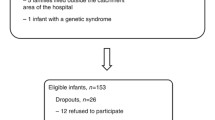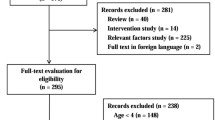Abstract
The aim of this study was to identify the determinants of children’s intelligence at 7 years, including pregnancy, postnatal, demographic factors, and small-for-gestational age (SGA) birth at term. Information was collected at birth (n = 871), 1 year (n = 744), 3.5 years (n = 550), and 7 years (n = 591). Approximately half of the children in this study were born SGA (birthweight ≤10th percentile). There was no significant difference found between IQ scores for SGA children compared to AGA children, after adjustment for potential confounders (p = 0.45). Paternal education, developmental delay, and birth order were associated with intelligence scores at 7 years in the multiple regression analysis. This study found no long-term effect of SGA birth at term on intelligence in middle childhood. Potentially modifiable postnatal and demographic factors were found to be strong predictors of intelligence at 7 years.
Similar content being viewed by others
References
Becroft DM, Thompson JM, Mitchell EA (2002) The epidemiology of placental infarction at term. Placenta 23:343–351. doi:10.1053/plac.2001.0777
Blake J (1981) Family size and the quality of children. Demography 18:421–442. doi:10.2307/2060941
Bouchard TJ Jr, Lykken DT, McGue M et al (1990) Sources of human psychological differences: the Minnesota Study of Twins Reared Apart. Science 250:223–228. doi:10.1126/science.2218526
Cohen S, Kamarck T, Mermelstein R (1983) A global measure of perceived stress. J Health Soc Behav 24:385–396. doi:10.2307/2136404
Dunst CJ, Jenkins V, Trivette CM (1984) The family support scale: reliability and validity. J Individ Fam Commun Wellness 4:45–52
Essex C, Smale P, Geddis D (1995) Breastfeeding rates in New Zealand in the first 6 months and the reasons for stopping. N Z Med J 108:355–357
Fattal-Valevski A, Leitner Y, Kutai M et al (1999) Neurodevelopmental outcome in children with intrauterine growth retardation: a 3-year follow-up. J Child Neurol 14:724–727. doi:10.1177/088307389901401107
Fergusson DM, Horwood L, Ridder EM (2005) Show me the child at seven II: childhood intelligence and later outcomes in adolescence and young adulthood. J Child Psychol Psychiatry 46:850–858. doi:10.1111/j.1469-7610.2005.01472.x
Fergusson DM, Lloyd M, Horwood L (1991) Family ethnicity, social background and scholastic achievement—an eleven year longitudinal study. N Z J Educ Stud 26:49–63
Frankenburg WK, Fandal AW, Thornton SM (1987) Revision of Denver prescreening developmental questionnaire. J Pediatr 110:653–657. doi:10.1016/S0022-3476(87)80573-5
Freeman JV, Cole TJ, Chinn S et al (1995) Cross sectional stature and weight reference curves for the UK, 1990. Arch Dis Child 73:17–24
Grantham-McGregor SM, Lira PI, Ashworth A et al (1998) The development of low birth weight term infants and the effects of the environment in northeast Brazil. J Pediatr 132:661–666. doi:10.1016/S0022-3476(98)70357-9
Hack M (1998) Effects of intrauterine growth retardation on mental performance and behavior, outcomes during adolescence and adulthood. Eur J Clin Nutr 52:S65–S70. doi:10.1038/sj.ejcn.1600517
Hart CL, Taylor MD, Davey Smith G et al (2003) Childhood IQ, social class, deprivation, and their relationships with mortality and morbidity risk in later life: prospective observational study linking the Scottish Mental Survey 1932 and the Midspan studies. Psychosom Med 65:877–883. doi:10.1097/01.PSY.0000088584.82822.86
Heiser A, Curcin O, Luhr C et al (2000) Parental and professional agreement in developmental assessment of very-low-birthweight and term infants. Dev Med Child Neurol 42:21–24. doi:10.1017/S0012162200000050
Kaplan GA, Turrell G, Lynch JW et al (2001) Childhood socioeconomic position and cognitive function in adulthood. Int J Epidemiol 30:256–263. doi:10.1093/ije/30.2.256
Lawlor DA, Batty GD, Morton SM et al (2005) Early life predictors of childhood intelligence: evidence from the Aberdeen children of the 1950s study. J Epidemiol Community Health 59:656–663. doi:10.1136/jech.2004.030205
Lawlor DA, Najman JM, Batty GD et al (2006) Early life predictors of childhood intelligence: findings from the Mater-University study of pregnancy and its outcomes. Paediatr Perinat Epidemiol 20:148–162. doi:10.1111/j.1365-3016.2006.00704.x
Li R, Ogden C, Ballew C et al (2002) Prevalence of exclusive breastfeeding among US infants: the Third National Health and Nutrition Examination Survey (Phase II, 1991–1994). Am J Public Health 92:1107–1110. doi:10.2105/AJPH.92.7.1107
Lundgren EM, Cnattingius S, Jonsson B et al (2001) Intellectual and psychological performance in males born small for gestational age with and without catch-up growth. Pediatr Res 50:91–96. doi:10.1203/00006450-200107000-00017
Mercy JA, Steelman LC (1982) Familial influence on the intellectual attainment of children. Am Sociol Rev 47:532–542. doi:10.2307/2095197
Ong KK, Ahmed ML, Emmett PM et al (2000) Association between postnatal catch-up growth and obesity in childhood: prospective cohort study. BMJ 320:967–971. doi:10.1136/bmj.320.7240.967
Paz I, Laor A, Gale R et al (2001) Term infants with fetal growth restriction are not at increased risk for low intelligence scores at age 17 years. J Pediatr 138:87–91. doi:10.1067/mpd.2001.110131
Slykerman RF, Thompson JM, Becroft DM et al (2005a) Breastfeeding and intelligence of preschool children. Acta Paediatr 94:832–837. doi:10.1080/08035250510031601
Slykerman RF, Thompson JM, Pryor J et al (2005a) Maternal stress, social support and preschool children's intelligence. Early Hum Dev 81:815–821. doi:10.1016/j.earlhumdev.2005.05.005
Sommerfelt K, Andersson HW, Sonnander K et al (2000) Cognitive development of term small for gestational age children at five years of age. Arch Dis Child 83:25–30. doi:10.1136/adc.83.1.25
Sommerfelt K, Ellertsen B, Markestad T (1995) Parental factors in cognitive outcome of non-handicapped low birthweight infants. Arch Dis Child Fetal Neonatal Ed 73:F135–F142. doi:10.1136/fn.73.3.F135
Sonnander K, Claesson M (1999) Predictors of developmental delay at 18 months and later school achievement problems. Dev Med Child Neurol 41:195–202. doi:10.1017/S0012162299000389
Thompson JM, Clark PM, Robinson E et al (2001) Risk factors for small-for-gestational-age babies: the Auckland Birthweight Collaborative Study. J Paediatr Child Health 37:369–375. doi:10.1046/j.1440-1754.2001.00684.x
Thompson JM, Mitchell EA, Borman B (1994) Sex specific birthweight percentiles by gestational age for New Zealand. N Z Med J 107:1–3
Wechsler D (1992) WISC-III: Wechsler Intelligence Scale for Children—third edition: manual. The Psychological Corporation: Harcourt Brace & Company, San Antonio
Whalley LJ, Deary IJ (2001) Longitudinal cohort study of childhood IQ and survival up to age 76. BMJ 322:819. doi:10.1136/bmj.322.7290.819
Wilson RS, Matheny AP (1983) Mental development: family environment and genetic influences. Intelligence 7:195–215. doi:10.1016/0160-2896(83)90029-6
Zajonc R (1976) Family configuration and intelligence: variations in scholastic aptitude scores parallel trends in family size and the spacing of children. Science 192:227–236. doi:10.1126/science.192.4236.227
Acknowledgments
The initial study at birth was funded by the Health Research Council of New Zealand. The 12-month postal questionnaire was funded by Hawkes Bay Medical Research Foundation. The 3.5-year follow-up was funded by the Child Health Research Foundation, Becroft Foundation, and Auckland Medical Research Foundation. The 7-year follow-up study was funded by Child Health Research Foundation. The 3.5-year and 7-year data collection phases were conducted at the Children’s Research Centre which is supported by the Starship Foundation and Auckland Healthcare Ltd. Reremoana Theodore was supported by the Health Research Council of New Zealand Maori Health Ph.D. Scholarship and the Nga Pae o te Maramatanga Doctoral Bridging Grant. Professor Ed Mitchell and Dr. John Thompson are supported by the Child Health Research Foundation. We acknowledge the assistance of Gail Gillies of the Children’s Research Centre, Barbara Rotherham, Helen Nagels, Christine Bibby Cornforth, and Kat Ryan for contacting or assessing the participants. Lastly, we sincerely thank the parents and children for participating in these studies.
Conflict of interest statement
The authors declare that they have no conflict of interest.
Author information
Authors and Affiliations
Corresponding author
Rights and permissions
About this article
Cite this article
Theodore, R.F., Thompson, J.M.D., Waldie, K.E. et al. Determinants of cognitive ability at 7 years: a longitudinal case–control study of children born small-for-gestational age at term. Eur J Pediatr 168, 1217–1224 (2009). https://doi.org/10.1007/s00431-008-0913-9
Received:
Accepted:
Published:
Issue Date:
DOI: https://doi.org/10.1007/s00431-008-0913-9




